Expungement bill moves out of Senate committee
 A House bill that that would automatically set aside certain felony and misdemeanor convictions moved out of the Senate Judiciary Committee this week. The committee, however, did add language to create a specified fund to cover, upon appropriations, costs for implementation, systems upgrades and staffing needs. MAC has requested clarification language to be included to ensure that any cost at the local level are also eligible under the fund.
A House bill that that would automatically set aside certain felony and misdemeanor convictions moved out of the Senate Judiciary Committee this week. The committee, however, did add language to create a specified fund to cover, upon appropriations, costs for implementation, systems upgrades and staffing needs. MAC has requested clarification language to be included to ensure that any cost at the local level are also eligible under the fund.
Still, MAC testified against House Bill 4980, by Rep. Eric Leutheiser (R-Branch), as a large concern outlined in written comments provided on June 11 has not yet be resolved: The legislation requires the Michigan State Police (MSP) database to set aside eligible convictions. However, there is no notification requirement on MSP to send that information to the local clerk and courts. Therefore, MAC is concerned some records may be public at the local level, while MSP has sealed the records. This inconsistency is contrary to the goal of the legislation and causes liability concerns for counties.
Also in committee, Sen. Tom Barrett (R-Eaton) offered language that allows a court to reinstate a conviction that was set aside, if a court has determined the individual has not made a good-faith effort to pay restitution.
The bill waits action on the Senate floor. The Senate has adjourned until late July.
For more information on this issue, contact Meghann Keit at Keit@micounties.org.
Senate approves summer property tax deferment bills
Individuals and businesses are one step closer to delaying their summer 2020 property tax payments to March 1, 2021, without penalty after a two-bill package gained Senate approval this week.
House Bills 5761 and 5810, by Rep. James Lower (R-Ionia), state that entities wishing to delay payments must submit an affidavit to their local tax collecting unit attesting to financial hardship due to the COVID-19 pandemic by Aug. 28, 2020, to qualify. Once a local unit has collected the affidavits, it would submit those to the county for tallying and submission to the Michigan Department of Treasury. Then, it would be incumbent upon the state to borrow enough money to make up for those unpaid taxes for all the taxing units, so locals do not run in to significant cash flow issues during the deferment period.
MAC supported the concept of the legislation. The bills now move to the governor for her signature.
For more information on this issue, please contact Deena Bosworth at bosworth@micounties.org.
Elections panel takes testimony on absentee ballots
 The clerk/register of deeds for Kent County told the Senate Elections Committee this week that she thinks the mailing of absentee voter applications to all voters is illegal and places additional burdens on county and local clerks.
The clerk/register of deeds for Kent County told the Senate Elections Committee this week that she thinks the mailing of absentee voter applications to all voters is illegal and places additional burdens on county and local clerks.
Kent’s Lisa Lyons made the comments during a hearing by the committee on recent policy changes and actions of Secretary of State Jocelyn Benson.
Under Proposal 3 of 2018, Lyons said every voter has a right to cast an absentee ballot. However, sahe said no elected official can send a ballot unless the voter has required it verbally or in writing per case law.
Additionally, the committee approved Senate Bills 977-78, by Sen. Kevin Daley (R-Lapeer), which would: make it a misdemeanor to knowingly making a false statement on an absent voter ballot application; make it a felony for knowingly submitting an absent voter ballot application containing or using another person’s name and personal identification information; and would make it a felony for knowingly submitting an application with the intent to obtain multiple ballots for a person. The Michigan Association of County Clerks supports the bills.
Full video of the committee hearing can be found here.
For more information on this issue, contact Meghann Keit at Keit@micounties.org.
Law enforcement grant applications due on Aug. 14

County law enforcement and courts that were previously ineligible for direct Coronavirus Emergency Supplemental Fund (CESF) grants can now apply for such funds until Aug. 14 at noon.
The Michigan State Police advises that the grant performance period spans from March 1, 2020, through Sept. 30, 2021, and all work must directly relate to the prevention of, preparation for or response to the COVID-19 pandemic.
County Sheriff, Jail and County Prosecutor Allocations can be found here.
County Allocations for Circuit/District/Probate courts can be found here.
Applications are due on Aug. 14. Forms and Instructions can be found here.
 MAC offices will be closed on July 3
MAC offices will be closed on July 3
MAC’s offices in Lansing will be closed on Friday, July 3 to observe the federal holiday for the Fourth of July.
Also, be advised that there will not be a Legislative Update on July 3, due to the national holiday.
Legislative Updates will resume on Friday, July 10.
 Staff picks
Staff picks
- Initial Impact of COVID-19 on Michigan Communities and Local Governments (CLOSUP)
- New Preparedness Handbook Details (unitedstatesofcare.org)
- How States Raise Their Tax Dollars (Pew Trusts)
- Leveraging Technology for Long-term Change in the Face of COVID-19 (thehill.com)
Legislature backs nearly $1 billion for COVID responses
 A large infusion of aid for local governments, first responders and health workers lacks only Gov. Gretchen Whitmer’s signature after the Legislature approved Senate Bill 690 this week.
A large infusion of aid for local governments, first responders and health workers lacks only Gov. Gretchen Whitmer’s signature after the Legislature approved Senate Bill 690 this week.
The bill, by Sen Jim Stamas (R-Midland), includes $880 million drawn from federal revenue allocated to Michigan through the CARES Act that established a $150 billion fund for state and local governments.
(Learn more about the legislation via a video episode of Podcast 83.)
Of this sum, local governments that didn’t receive direct federal aid would get $200 million. To receive funds, counties must submit by July 17 their public safety and public health payroll expenditures for the months of April and May. Expenditures are not eligible if they have been, or will be, reimbursed by any other federal funds (FEMA, HHS, DOJ, etc.).
Another $100 million is set aside for hazard pay for first responders. For these funds, counties must apply for payment or reimbursement through the Michigan Department of Treasury by Sept. 30. Payments and reimbursements will be made on a first-come, first-served basis. Eligible employees include law enforcement officers, firefighters, emergency medical technicians, paramedics, 911 operators, local corrections officers, airport public safety officers and ambulance operations personnel.
Direct care workers, including those in county medical care facilities, will see a $2 per hour temporary increase beginning July 1 and running through Sept. 30. The $120 million set aside for this also will cover costs incurred by the employer, including payroll taxes, due to the increase. Eligible workers include registered nurses, licensed practical nurses, competency-evaluated nursing assistants and respiratory therapists.
Other key elements in the bill are:
- $25 million in grants for PPE, testing and testing equipment to priority providers
- $60 million for a rental assistance program
- $155 million in small business restart grants
- $29 million for additional unemployment insurance agency employees
- $1.4 million for the Bureau of Community and Health Systems to conduct COVID-19 infection control surveys in medical care facilities
The bill was sent to the governor for final approval, and she has released a statement of support, while also alluding to additional relief in the future:
“While it is good news that more than $850 million is now appropriated for additional relief across the state, much more work lies ahead to ensure that schools and local communities will have the funding and resources they need.”
For more information on this issue, contact Deena Bosworth at bosworth@micounties.org.
 Podcast 83 discusses eventful legislative week
Podcast 83 discusses eventful legislative week
Deena Bosworth and Meghann Keit of MAC’s Governmental Affairs Team run down an eventful week in Lansing in a video episode of Podcast 83, MAC’s podcast on all news and things county-related in Michigan.
To view the newest episode, visit the Podcast 83 page on the MAC website.
Virtual options under Open Meetings Act extended to July 31
 County boards can continue to hold public meetings remotely under the Open Meetings Act due to a new order signed by Gov. Gretchen Whitmer Thursday night. Executive Order 129 extends a previous EO allowing such meetings during the ongoing COVID-19 pandemic to July 31, 2020.
County boards can continue to hold public meetings remotely under the Open Meetings Act due to a new order signed by Gov. Gretchen Whitmer Thursday night. Executive Order 129 extends a previous EO allowing such meetings during the ongoing COVID-19 pandemic to July 31, 2020.
“As we continue our efforts to flatten the curve and prevent a second wave of COVID-19, it’s important for public bodies to be able to continue holding meetings and the public to participate in those meetings,” Governor Whitmer said in a statement. “By allowing for remote meetings, public bodies and residents can continue practicing safe social distancing while also ensuring meetings remain open, accessible and transparent to the public.”
Public bodies must meet the following criteria when holding a public meeting remotely:
- Ensure two-way communication for members and the public to hear and address each other when speaking.
- Provide adequate notice to the public of the meeting.
- Post a public meeting notice on their website.
- Permit participants to record or broadcast the public meeting.
- Allow participants to address the public body during a public comment period.
For technical tips on conducting remote sessions, visit MAC’s COVID-19 Resources Page.
Senate votes to reset FY21 budget deadline
 A law requiring the Legislature to deliver a budget to the governor by July 1 would be set aside for the fiscal 2021 budget under a bill approved by the Senate this week.
A law requiring the Legislature to deliver a budget to the governor by July 1 would be set aside for the fiscal 2021 budget under a bill approved by the Senate this week.
Senate Bill 963, by Sen. Curtis Hertel Jr. (D-Ingham), would nullify the requirements of Public Act 160 of 2019 for this cycle, in deference to the effects of the COVID-19 crisis on tax collections.
The rules under PA 160 would resume next year.
The delay measure is now before the Michigan House of Representatives.
The state’s budget year starts on Oct. 1 and state leaders already agreed to hold a special Consensus Revenue Estimating Conference in August to give lawmakers a better idea of how much revenue will be available for the FY21 budget.
For more information on this issue, contact Deena Bosworth at bosworth@micounties.org.
Summer property tax deferment bills pass House
 Individuals and businesses could delay their summer 2020 property tax payments to March 1, 2021, without penalty under a two-bill package passed by the House unanimously this week.
Individuals and businesses could delay their summer 2020 property tax payments to March 1, 2021, without penalty under a two-bill package passed by the House unanimously this week.
House Bills 5761 and 5810, by Rep. James Lower (R-Ionia), state that entities wishing to delay payments must submit an affidavit to their local tax collecting unit attesting to financial hardship due to the COVID-19 pandemic by Aug. 28, 2020, to qualify. Once a local unit has collected the affidavits, it would submit those to the county for tallying and submission to the Michigan Department of Treasury. Then, it would be incumbent upon the state to borrow enough money to make up for those unpaid taxes for all the taxing units, so locals do not run in to significant cash flow issues during the deferment period.
MAC has worked closely with the bill sponsor, the Michigan Association of County Treasurers, the Michigan Chamber of Commerce and the other local government associations in the development of the legislation. Although significant progress has been made on the bills, MAC remains neutral on the legislation until such time as we have greater assurances that Treasury can and will absorb any of the costs associated with administering the program.
The bills move to the Senate and could be reviewed as early as next week.
For more information on this issue, contact Deena Bosworth at bosworth@micounties.org.
CoPro+ launches PPE Program to save counties money
 CoPro+, MAC’s cooperative purchasing program especially designed for counties and other public entities, has responded to the COVID-19 pandemic by creating a robust new program to give public entities the best possible prices and services on Personal Protective Equipment.
CoPro+, MAC’s cooperative purchasing program especially designed for counties and other public entities, has responded to the COVID-19 pandemic by creating a robust new program to give public entities the best possible prices and services on Personal Protective Equipment.
Visit the CoPro+ homepage to start learning details about the program and how it can serve your needs.
The cooperative also is expanding its social media presence. Look for information on new vendors and deals via Facebook and Instagram.
Please check back to our site regularly for new details on deals and ordering.
Ballot experts talk ‘shoebox’ voters and more on Camp Counties webinar
 Who are “shoebox voters”? What are the critical two weeks in any millage election campaign? Due to Proposal 3 of 2018 and the coronavirus pandemic, what percentage of voters are expected to cast ballots by mail in August and November?
Who are “shoebox voters”? What are the critical two weeks in any millage election campaign? Due to Proposal 3 of 2018 and the coronavirus pandemic, what percentage of voters are expected to cast ballots by mail in August and November?
These questions and more were tackled this week by Adrian Hemond and Scott Bean of Grassroots Midwest in the second of five Camp Counties webinars, “Planning and Winning Millage Elections in a COVID World.”
The webinars, supported by Enbridge, Envirologic and other corporate partners, were started to replace MAC’s regular Regional Summits, which were cancelled due to the coronavirus.
To see the election presentation, and register for upcoming events, visit the camp page on the MAC website. All webinars are free for MAC members.
State orders more COVID testing in medical homes
 New COVID testing requirements for residents of medical care facilities were ordered this week by the Michigan Department of Health and Human Services.
New COVID testing requirements for residents of medical care facilities were ordered this week by the Michigan Department of Health and Human Services.
The order, effective immediately, requires such facilities to test in the following manner:
“i. Initial testing of all residents and staff;
- Testing of all new or returning residents during intake unless tested in the last 72 hours;
iii. Testing any resident or staff member with symptoms or suspected exposure;
- Weekly testing of all residents and staff in facilities with any positive cases among residents or staff, until 14 days after the last new positive;
- Testing of all staff in Regions 1 through 5 and 7, at least once between the date of this order and July 3, 2020;
- Weekly testing of all staff in regions of medium or higher risk on the MI Safe Start Map”
To see which region your county is it, please check the MI Start map.
The order also requires facilities to complete a plan for conducting testing consistent with the above requirements, no later than June 22. The plans must be executed no later than June 29.
Failure to comply with the testing order is “subject to a $1,000 fine for each violation or for each day that a violation continues. Any violation of the order by a facility regulated by LARA shall be referred to the agency for determination whether to pursue additional enforcement action as it deems appropriate.”
Also, signed by the governor this week was an extension of “Enhanced protections for residents and staff of long-term care facilities during the COVID-19 pandemic.” EO 123 continues to require transfer to a regional hub if a dedicated unit is not available and provide requirements facilities must meet such as canceling all communal dining. The order continues through July 12.
For more information on this issue, contact Meghann Keit at keit@micounties.org.
Indigent Defense Commission approves FY21 grant contract
 An indigent services grant contract for fiscal 2021 was approved by the Michigan Indigent Defense Commission (attached) this week.
An indigent services grant contract for fiscal 2021 was approved by the Michigan Indigent Defense Commission (attached) this week.
The new contract reflects changes developed in conjunction with MAC and member counties and includes removal of the excess grant from the previous year to the total authorized budget on page 1. Removing this allows contracts to be executed in a timelier manner, as statute does not require excess funding to be reported until Oct. 31. Any unused funds will be reduced in the second and third disbursements equally.
The disbursement schedule is unchanged, with 50 percent advanced within 15 days of the executed agreement, and then two 25 percent payments on May 15 and Aug. 14 in 2021. See letter to stakeholders.
The new contract also ensures that county-commission disputes or unresolved documentation issues do not hold up funding for uncontested services or the issuance of grant contracts. Some counties have encountered problems in the past due to disputes over a couple of line items that held up the larger portion of their funding.
The commission also began its review of compliance planning and cost analysis of local systems. That work will continue at its next meeting on Aug. 18. The meeting packet can be found here. The commission meeting was also recorded and can be viewed at the commission site.
For more information on this issue, contact Meghann Keit at keit@micounties.org.
Grants available for Child/Parent Legal Representation program
 The Michigan Department of Health and Human Services (MDHHS) is inviting each circuit court that did not apply for the FY20 IV-E Child and Parent Legal Representation (CPLR) Grant to apply for the upcoming fiscal year, 2021. Grant funds will run through Sept. 30, 2021, with an effort to get a start date of those funds as close to Oct. 1, 2020, as possible.
The Michigan Department of Health and Human Services (MDHHS) is inviting each circuit court that did not apply for the FY20 IV-E Child and Parent Legal Representation (CPLR) Grant to apply for the upcoming fiscal year, 2021. Grant funds will run through Sept. 30, 2021, with an effort to get a start date of those funds as close to Oct. 1, 2020, as possible.
Through this grant, the department will make a claim for title IV-E eligible legal representation expenditures paid by the court. Eligible expenditures are costs from legal representation of a child and/or parent in child protective proceedings where at least one child is placed in out-of-home placement (foster care). MDHHS will determine the type and amount of eligible expenditures and provide the court the applicable title IV-E funds.
Note: If you have been participating in the FY20 CPLR Grant cycle or were on the original FY20 list but withdrew, please look for an email from the MDHHS-IVE-LRGrant@michigan.gov.
Your Intent to Apply for FY21 must be submitted by July 1. Courts will need to estimate the amount the county plans to spend on parent attorneys and LGALs in foster care cases in FY21, but the amount can be changed later if it needs to be.
Questions about the grant application and process may be submitted to MDHHS-IVE-LRGrant@michigan.gov.
 Staff picks
Staff picks
- America’s Biggest Park Struggles to Survive the Pandemic (Governing)
- Elections and COVID-19: A discussion between Ingham Clerk Barb Byrum and MSU Extension’s Eric Walcott (MSU Extension)
- This is your state’s favorite vegetable (Dailymeal.com)
- Why are so many people not wearing masks? Here’s how they explain it. (Los Angeles Times)
Michigan Senate endorses flexible use of federal CARES Act dollars
 The Michigan Senate called on the federal government to ease restrictions on use of the nearly $3.8 billion Michigan has received from the CARES Act via a resolution passed Thursday.
The Michigan Senate called on the federal government to ease restrictions on use of the nearly $3.8 billion Michigan has received from the CARES Act via a resolution passed Thursday.
Senate Resolution 124, by Sen. Winnie Brinks (D-Kent), acknowledges the revenue shortfalls for the state and local units of government and implores Congress to allow the use of these funds to help fill the mounting deficits faced by Michigan and local governments. The State is facing a $3 billion deficit for Fiscal 2020, which ends Sept. 30. Without additional flexibility for CARES funds, severe budget cuts across all levels of government are inevitable.
The Legislature and the Gov. Gretchen Whitmer also are in discussions about extending the July 1, 2020, deadline for presenting the governor a budget for fiscal 2021, which begins Oct. 1, ,2020. Due to the uncertainty on revenues for next year and over federal assistance, completing a new budget will challenge state leaders. An additional Consensus Revenue Estimating Conference is scheduled for August. At that time, a clearer picture of the budget damage will provide legislators more guidance on their options.
For more information on this issue, contact Deena Bosworth at bosworth@micounties.org.
MAC expresses concern on expungement bill
 Counties have concerns with the mechanics of House Bill 4980, part of a package of bills on expunging criminal records, the Michigan Association of Counties told the Senate Committee on Judiciary and Public Safety this week.
Counties have concerns with the mechanics of House Bill 4980, part of a package of bills on expunging criminal records, the Michigan Association of Counties told the Senate Committee on Judiciary and Public Safety this week.
The committee took testimony on bills to expand the eligibility to remove specific convictions from the public criminal record. HB 4980 would create an automatic process, in which certain offenses would be set aside without requiring a petition process overseen by a judge.
Countywide elected officials expressed concerns about the automatic provisions during the committee hearing. Prosecutors from Berrien and Marquette also opposed an automatic process and encouraged the committee to preserve the ability of victims to part of the expungement process. Additionally, the prosecutors pointed out that out-of-state convictions will not be considered under the current bill language. Undersheriff Daniel Pfannes of Wayne County also testified in opposition to HB 4980 on behalf of the Michigan Sheriffs’ Association.
In written testimony to the committee, MAC noted that recent versions of the bill require certain records in the Michigan State Police (MSP) database to be set aside after a period of seven or 10 years. However, nothing in the bill requires MSP to then transfer a notification to the local court that these records are sealed. Therefore, the record would still be accessible through the court or county clerk. Additionally, changes to state-administered databases may occur, but it is unclear how the system changes will affect local government case management systems and the potential cost attached.
MAC will continue to work with state agencies and legislative leaders to address logistical and fiscal concerns.
For more information on this issue, contact Meghann Keit at keit@micounties.org.
Candidates can now file for MAC Board seats
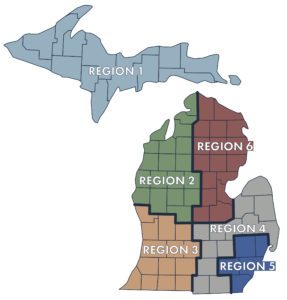 At the 2020 Michigan Counties Annual Conference in August, MAC members will vote on six seats on the MAC Board of Directors.
At the 2020 Michigan Counties Annual Conference in August, MAC members will vote on six seats on the MAC Board of Directors.
Commissioners wishing to serve on the Board, whether incumbents or new candidates, have until July 16 to file official notice of their intent to run. Board terms are for three years.
Seats representing regions are filled by a vote in regional caucuses at the conference. At-large seats are filled by the candidate that wins a majority of the six regional caucuses.
The MAC Board of Directors is the key body in guiding the legislative and organizational strategies of MAC.
2020 Board seats
- Region 1 — 1 seat
- Region 2 — 1 seat
- Region 3 — 1 seat
- Region 4 — 1 seat
- Region 5 — 1 seat
- At-large — 1 seat
Any member wishing to run in the election must download the application form and return it by July 16, 2020, to Derek Melot (melot@micounties.org) to be eligible. Please also share a brief statement of why you wish to serve on the MAC Board. The information will be shared with voting members on the website prior to the elections
If you have any questions about Board duties, please contact Executive Director Stephan W. Currie at 517-372-5374.
Policy platform drafts now available for review by members
 Platforms that would guide MAC’s policy advocacy for the coming year are now available for review on MAC’s website.
Platforms that would guide MAC’s policy advocacy for the coming year are now available for review on MAC’s website.
The drafts were crafted by the association’s policy committees and reviewed and approved by the Board of Directors at its June 5 session.
MAC also will be sending the platforms electronically to counties to share with commissioners.
Since this year’s session will be done electronically, the Board also voted to require that all member amendments for the platforms be submitted in writing to MAC by 5 p.m. on Aug. 7. Amendments will not be accepted from “the floor” during the virtual meeting, whose date has not yet been set, but which will occur between Aug. 18-27 during the Virtual Annual Conference.
For questions on the platforms, contact Deena Bosworth at bosworth@micounties.org.
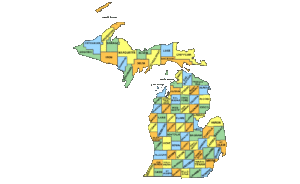 Counties advise on opening status
Counties advise on opening status
Counties across Michigan reported they have either resumed public access to buildings or on the brink of doing so via emails shared by county administrators this week.
MAC created a summary of these comments and plans that includes responses from 33 counties.
Benzie’s work on rural broadband opens Camp Counties series
 A case study from Benzie County on their work to expand and improve internet service was the focus of the first of five webinars under MAC’s Camp Counties series.
A case study from Benzie County on their work to expand and improve internet service was the focus of the first of five webinars under MAC’s Camp Counties series.
Robert Russell, one of the leaders of the Benzie effort, walked attendees through the challenges, particularly topographical, and options the Benzie group has encountered over the last two years.
The video from the webinar and Russell’s slide deck are available for 24/7 viewing at the Camp Counties webpage.
Also visit the page to register for upcoming sessions, with the next one, on June 17, to focus on tips for planning and winning millage elections in a COVID world.
Nursing home monitoring bill advances
 A bill to require nursing homes and medical care facilities to allow residents to place a camera in their room advanced out of a Senate committee this week, despite opposition from the Michigan County Medical Care Facilities Council (MCMCFC).
A bill to require nursing homes and medical care facilities to allow residents to place a camera in their room advanced out of a Senate committee this week, despite opposition from the Michigan County Medical Care Facilities Council (MCMCFC).
Senate Bill 77, by Sen. Jim Runestad (R-Oakland), moved out of the Senate Health Policy Committee and to the Senate floor. Under the bill, the resident would have to cover the cost, maintenance and activation of the electronic device. If a resident shares a room with another, written permission must be granted by the other party or their representative.
MCMCFC opposes the legislation due to concerns around the dignity and privacy rights of the resident. According to an article in The Elder Law Journal, “Monitoring technologies that aim to safeguard residents against perceived threats to health and safety can, in so doing, create their own threats to their autonomy and well-being.”
“Most nursing homes already have cameras in hallways and other common areas, but cameras in bedrooms, where residents are being dressed, bathed or receiving other medical treatments, is something that most people would not want for themselves,” said Renee Beniak, executive director of MCMCFC.
Additionally, the larger issue at hand should be addressed regarding resident care: the shortage of nurses and nursing assistant. Without adequate staffing, nurses are put under extreme pressure to care for their residents in a timely manner.
MCMCFC will continue to work to improve the legislation.
For more information on this issue, contact Meghann Keit at keit@micounties.org.
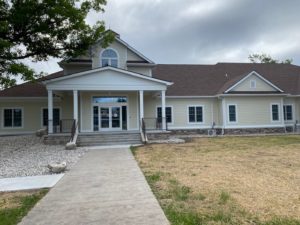 Oscoda moves into new building, 4 years after fire
Oscoda moves into new building, 4 years after fire
Oscoda County opened its new Government Building to the public on June 10.
“So far, so good,” reported Clerk Jeri Winton. “It has been a joy to be in the new building after four years of being in a double-wide, and to be able to allow our voters in so they can conduct their business has been great!”
The new building was needed after a fire in May 2016 destroyed the county’s historic courthouse, which was built in 1888 and listed in the National Register of Historic Places.
 Staff picks
Staff picks
- Northeast Michigan courts to continue working virtually for foreseeable future (Alpena News)
- Alisha Bell: Michigan’s Unstoppable Force of Leadership (Governing magazine)
- BCBS to extend no-cost benefits for COVID-19 treatment through end of 2020 (Blue Cross Blue Shield)
- The most popular candy by state (thedailymeal.com)
 At the 2020 Michigan Counties Annual Conference in August, MAC members will vote on six seats on the MAC Board of Directors.
At the 2020 Michigan Counties Annual Conference in August, MAC members will vote on six seats on the MAC Board of Directors.
Commissioners wishing to serve on the Board, whether incumbents or new candidates, have until July 16 to file official notice of their intent to run. Board terms are for three years.
Seats representing regions are filled by a vote in regional caucuses at the conference. At-large seats are filled by the candidate that wins a majority of the six regional caucuses.
The MAC Board of Directors is the key body in guiding the legislative and organizational strategies of MAC.
2020 Board seats
- Region 1 — 1 seat
- Region 2 — 1 seat
- Region 3 — 1 seat
- Region 4 — 1 seat
- Region 5 — 1 seat
- At-large — 1 seat
Any member wishing to run in the election must download the application form and return it by July 16, 2020, to Derek Melot (melot@micounties.org) to be eligible. Please also share a brief statement of why you wish to serve on the MAC Board. The information will be shared with voting members on the website prior to the elections
If you have any questions about Board duties, please contact Executive Director Stephan W. Currie at 517-372-5374.
MAC Board votes to shift Annual Conference to virtual sessions
 The 2020 MAC Annual Conference will be a virtual event stretching across several days in late August, the MAC Board of Directors decided during a meeting on Friday.
The 2020 MAC Annual Conference will be a virtual event stretching across several days in late August, the MAC Board of Directors decided during a meeting on Friday.
“With counties and vendors alike still sorting through the budget problems caused by COVID, we had a real concern that attendance would drop, and the event would be costly for MAC,” said Board President Veronica Klinefelt of Macomb County. “Based on the success of the Virtual Legislative Conference and the continuing research of our MAC staff, the Board saw a virtual event as the better option.”
The virtual event will include workshops, plenary sessions, opportunities to interact with exhibiting vendors, board elections and the Annual Business Meeting on Aug. 18 to approve MAC’s policy platforms for the coming year.
The Board approved the draft platforms for the membership vote this week. Those drafts soon will be made available on MAC’s website and sent electronically to all counties for members’ review in advance of the Annual Business Meeting.
Since this year’s session will be done electronically, the Board also voted to require that all member amendments for the platforms be submitted in writing to MAC by 5 p.m. on Aug. 7. Amendments will not be accepted from “the floor” during the virtual meeting on Aug. 18.
Full details about the virtual conference, including exact dates, speakers and registration, will be released in early July.
The conference originally was scheduled for Aug. 16-19 at the Radisson Hotel in downtown Kalamazoo. MAC has arranged with the venue to reset that in-person event to 2023.
MAC’s conferences in 2021 are scheduled for April 27-29 in Lansing (Legislative) and Sept. 26-28 at the Grand Hotel on Mackinac Island (Annual).
For the latest conference-related news, visit MAC’s website.
Executive orders loosen economic restrictions due to COVID-19
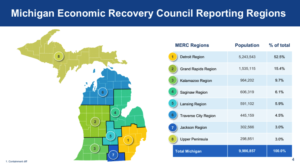 Two executive orders on Friday will continue to ease economic restrictions imposed earlier due to the coronavirus crisis.
Two executive orders on Friday will continue to ease economic restrictions imposed earlier due to the coronavirus crisis.
On June 10, Regions 6 and 8, which include much of Northern Michigan and the Upper Peninsula, will advance to Phase 5 of the governor’s MI Safe Start Plan. Phase 5 allows the reopening of salons, movie theaters, and gyms, subject to safety protocols and procedures designed to minimize the spread of COVID-19.
On June 15, personal services including hair, massages, and nails will reopen statewide. Though the remaining regions, 1 through 5 and 7, will remain in Phase 4 under the new executive orders. The governor said she expects the entire state will advance to Phase 5 in the coming weeks.
Normal FOIA requirements resume on June 11
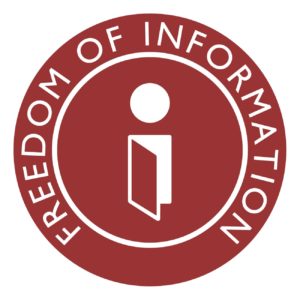 Normal requirements under the state’s Freedom of Information Act resume on June 11, Gov. Gretchen Whitmer stated in a new Executive Order on June 3.
Normal requirements under the state’s Freedom of Information Act resume on June 11, Gov. Gretchen Whitmer stated in a new Executive Order on June 3.
FOIA requirements had been modified by Whitmer in Executive Order 38 during the height of the COVID-19 crisis and in response to the disrupt to local government operations.
That order was to expire on June 4, but Whitmer issued EO 112 to extend modifications, but only to June 11. Starting next week, counties are subject to all of the normal deadline and response requirements under the transparency law.
Hazard pay measure awaiting House floor action

A supplemental budget bill that includes hundreds of millions of dollars in payments for first responders and health workers awaits action on the Michigan House floor after its approval by the full Senate and the House Appropriations Committee.
Senate Bill 690, by Sen. Jim Stamas (R-Midland), is the subject of continuing negotiations between the Legislature and the governor. At issue is the $3.2 billion in Federal CARES Act dollars allocated for the state of Michigan. Guidance from the Federal Department of Treasury prohibits the use of these funds for revenue replacement and restricts the spending for COVID-19 related expenses.
While state and local governments are trying to balance budgets with significant revenue shortfalls, these funds can provide some relief under certain conditions. Included in current version of SB 690 is $100 million for hazard pay for public safety workers, $226.5 million for a pay differential for direct care workers and $200 million for grants to small businesses in the form of restart grants. The bill spends approximately $1.25 billion of the CARES money, but that amount is subject to change based on negotiations.
MAC has not taken a position on the bill yet.
For more information on this issue, contact Deena Bosworth at bosworth@micounties.org.
Property tax bills advance despite MAC concerns
 Legislation to provide relief for taxpayers struggling to pay their summer property tax bills on time advance out of its initial House review this week.
Legislation to provide relief for taxpayers struggling to pay their summer property tax bills on time advance out of its initial House review this week.
House Bills 5761 and 5810, by Rep. James Lower (R-Ionia), chair of the House Local Government and Municipal Finance Committee, will amend the General Property Tax act to do several things:
- Forgive interest and fees for property owners who qualify for the program due to financial hardship associated with the Covid-19 pandemic. Qualification will be based on an affidavit of hardship regardless and will apply to all types of property, not just residential.
- Require local units to submit unpaid summer taxes to the county treasurer by Oct. 1, 2020, instead of waiting until they become delinquent on March 1, 2021.
- Require county treasurers to advance the payment to local units in the amount of the summer taxes turned over to the county to assist with cash flow for taxing jurisdictions.
Language was added to the bill that indicates an intention of the Legislature to appropriate the money to cover the interest and costs associated with the advancement of money to local units from the Delinquent Tax Revolving Fund (DTRF).
It is unclear how many individuals and businesses would utilize the program, but many homeowners and businesses will be struggling to meet their financial obligations after such a long shutdown. If it is widely utilized, the advancement of payment from the DTRF could be in the billions of dollars, which in turn would require substantial borrowing by county treasurers in order to meet the obligations for cash set forth in the legislation. The critical components would be the ability for treasurers to borrow the funds and the guarantee by the state to pay for the additional expenditures and the lost interest used to repay the notes.
The bill sponsor has been working with MAC and other local units closely throughout this process to address our concerns, but MAC remains without a position on the legislation until solutions to the concerns can be found.
The bills have been referred to the House Committee on Appropriations for further consideration.
For more information on this issue, contact Deena Bosworth at bosworth@micounties.org.
Major changes to solid waste management proposed

Legislation making substantial changes to how counties handle solid waste was introduced this week in Lansing.
House Bills 5812-5817 were discussed in the House Natural Resources and Outdoor Recreation Committee on Tuesday. Among the goals of bill sponsors are increasing Michigan’s overall recycling rate to 45 percent in the long term; increasing curbside recycling statewide; creating new recycling markets by increasing permitting fees for material management facilities; and funding counties to rewrite their waste management plans.
The most important bill for counties in the package is HB 5817, by Rep. Joe Tate (D-Wayne), which would replace county solid waste management plans with Materials Management Plans (MMP) and provide for funding to do the work. Counties would receive upfront funding through the Renew Michigan Fund at a rate of $60,000 plus 50 cents per resident in the county that will cover “100% of eligible costs” for three years, the timeline to finish the MMP. The bill would also permit counties to levy landfill surcharges, hauler licensing fees and other tools to finance adequate materials management practices.
Other bills in the package will eliminate the need to monitor imports and exports between counties, preserve local control in the siting of new material management facilities and increase financial assurance requirements for private landfills. A fiscal analysis of each of the bills can be found here.
The package is the result of findings from a 2016 task force created by Gov. Rick Snyder: the Solid Waste and Sustainability Advisory Panel. Recommendations from the report included empowering counties to plan for waste management practices other than landfilling, such as composting and recycling.
The bills are scheduled for further testimony in the House Natural Resources & Outdoor Recreation Committee on Tuesday, June 9.
MAC has not yet taken a position on the bills.
For more information on this issue, contact Michael Ruddock at ruddock@micounties.org.
Federal guidance: States need to send CARES Act money to locals
 In comments released late last week, U.S. Treasury officials said that state governments need to be sharing CARES Act money with local governments that did not qualify for direct payments under the act due to their population. This guidance affirms what MAC has been saying in ongoing discussions with the State Budget Office on the need for state help to address COVID-19 financial effects.
In comments released late last week, U.S. Treasury officials said that state governments need to be sharing CARES Act money with local governments that did not qualify for direct payments under the act due to their population. This guidance affirms what MAC has been saying in ongoing discussions with the State Budget Office on the need for state help to address COVID-19 financial effects.
In Michigan, the federal guidance would apply to 79 of the 83 counties.
The guidance came via a May 28 FAQ document, which states:
“Should States receiving a payment transfer funds to local governments that did not receive payments directly from Treasury?
“Yes, provided that the transferred funds are used by the local government for eligible expenditures under the statute. To facilitate prompt distribution of Title V funds, the CARES Act authorized Treasury to make direct payments to local governments with populations in excess of 500,000, in amounts equal to 45% of the local government’s per capita share of the statewide allocation. This statutory structure was based on a recognition that it is more administratively feasible to rely on States, rather than the federal government, to manage the transfer of funds to smaller local governments. Consistent with the needs of all local governments for funding to address the public health emergency, States should transfer funds to local governments with populations of 500,000 or less, using as a benchmark the per capita allocation formula that governs payments to larger local governments. This approach will ensure equitable treatment among local governments of all sizes.
“For example, a State received the minimum $1.25 billion allocation and had one county with a population over 500,000 that received $250 million directly. The State should distribute 45 percent of the $1 billion it received, or $450 million, to local governments within the State with a population of 500,000 or less.”
MAC will continue to make the case for state help for counties as the budget process continues.
For more information on this issue, contact Deena Bosworth at bosworth@micounties.org.
![]() MAC has created a dedicated page of information related to 2020 Census efforts.
MAC has created a dedicated page of information related to 2020 Census efforts.
County leaders understand the importance of getting an accurate count of Michiganders to leverage maximum investment from the federal government. Visit the page at https://micounties.org/2020-census/ to find videos for local leaders, resources to maximize response rates and much more. The page will be updated frequently.
 Next Treasury webinar is June 9
Next Treasury webinar is June 9
The latest in a series of webinars for local government officials who are dealing with COVID-19’s financial impacts will be at 2 p.m. on Tuesday, June 9. The event is co-sponsored by MAC and other local government groups.
To register, click here. Be advised that “seating” is limited, so registration as soon as possible.
State releases new tools on reopening
 In an effort to help reopening businesses safely reengage in the economy, the MI Symptoms Web Application is a cost-free way for employers to comply with Executive Order 2020-97 and implement a COVID-19 symptoms screening questionnaire for employees.
In an effort to help reopening businesses safely reengage in the economy, the MI Symptoms Web Application is a cost-free way for employers to comply with Executive Order 2020-97 and implement a COVID-19 symptoms screening questionnaire for employees.
Designed primarily for employers and employees, the online tool is also available to all Michigan residents. Users enter information daily to help identify symptoms that might be caused by the virus and to make decisions about when to seek appropriate medical care. Local and state public health will also use the collective data to help identify the potential for new outbreaks of the disease.
Some employers may ask or require employees to use MI Symptoms as they return to work to help identify potential cases of COVID-19 before it can spread. Employees will have an objective tool to inform their employer that they should not be coming to work without having to share symptom-specific information.
If you choose to participate, employers can create a profile. After creation, a code will be generated that can be shared with employees to use on their profiles.
MI Symptoms and MI Safe Start Map support the state’s “Contain COVID” efforts by linking symptomatic individuals to resources and providing data to plan and evaluate the impact of target, testing and protection efforts as necessary to begin to safely reengage the economy.
SMART Fund bill would provide $500 billion to states and locals

A co-sponsor of federal legislation to funnel an additional $500 billion in corona aid to states and local governments released a detailed description of the measure this week.
Rep. Fred Upton (R-MI 6) is one of the original House co-sponsors of H.R. 6954, called the SMART Fund, which would “provide $500 billion in emergency funding to every state, county, and community in the country to help keep essential workers on the payroll and Michigan residents safe, while prioritizing state and local assistance based on population size, infection rates and revenue losses.”
Upton explained the funding would be allocated as follows:
- 33 percent based on population Size – “This tranche of funding will be allocated to all 50 states, D.C. and U.S. territories in proportion to each respective state or territory’s percentage of the U.S. population. Counties and municipalities will each get a share of one-sixth of their state’s respective allocation for a combined total of one-third of their state’s allocation from this tranche. Funding will be distributed to counties and municipalities based on each county or municipality’s proportion of the state’s population.”
- 33 percent based on infection rates – “This tranche of funding will be allocated based on each state’s relative share of the nation’s infection rate. … Counties and municipalities will each get a share of one-sixth of their state’s respective allocation for a combined total of one-third of their state’s allocation from this tranche. Funding will be distributed to counties and municipalities based on each county or municipality’s proportion of the state’s population.”
- 33 percent based on revenue losses – “This tranche of funding will be allocated based on each state’s revenue loss in proportion to the combined revenue loss of all the states from Jan. 1, 2020 through Dec. 31, 2020. … Counties and municipalities will each get a share of one-sixth of their state’s allocation for a combined total of one-third of their state’s allocation. Funding will be distributed to counties and municipalities based on each county or municipality’s revenue loss … in proportion to the combined revenue loss for all counties and municipalities in the state over this period.”
Upton is joined as a co-sponsor on the bill by Rep. Debbie Dingell (D-MI 12). For more information on the measure, visit www.upton.house.gov.
 Staff picks
Staff picks
- Michigan’s vaccination rates drop, could lead to outbreaks (Associated Press)
- Michigan assures voting by mail won’t be riddled with fraud (Governing)
- The Employment Situation, May 2020 (Bureau of Labor Statistics)
- How much money do MLB players really make? (Fivethirtyeight.com)







